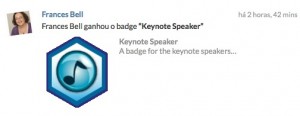Perosnal Learning Environment Conference 2012 – Join us
 I am off to Porto tomorrow and then on to Aveiro for the Personal Learning Environment Conference 2012. Ironically I was reading an article a couple of days ago saying “It’s time to create the Conference 2.0 by flipping the current setup of major education conferences”. I don’t know if the PLE conference can be called ‘major’. I think one of the ideas of the Conference 2.0 is to get away form the idea of a major conference filled with endless tracks covering everything under the sun and mainly attracting delegate through educational tourism offers. I prefer smaller, more intimate and more connected events.
I am off to Porto tomorrow and then on to Aveiro for the Personal Learning Environment Conference 2012. Ironically I was reading an article a couple of days ago saying “It’s time to create the Conference 2.0 by flipping the current setup of major education conferences”. I don’t know if the PLE conference can be called ‘major’. I think one of the ideas of the Conference 2.0 is to get away form the idea of a major conference filled with endless tracks covering everything under the sun and mainly attracting delegate through educational tourism offers. I prefer smaller, more intimate and more connected events.
PLE is a flipped conference. I am not going to claim it is the first, but in all three of the conferences we have organised we have placed a stress on interaction and knowledge sharing. We have fought against traditional paper presentations, instead arguing that the papers can be read on line and what we want of in depth discussion and consideration of the ideas behind the papers. To that end we have invited chair people and participants to come up with their own ideas on how this can be facilitated. We have introduced unconferencing slots – including the ‘speakers corner’ – this year on the beach! and pecha keucha. We introduced unkeynotes – with speakers working in pairs to develop presentations that involved participants – both face to face and on-line (see crowdsourcing for one of this years unkeynotes by Ricardo Torres and Grainne Conole). This years innovations include the integration of Mozilla badges into the conference social networking site and the ‘One Conference – Two Venues’ idea – with face to face sessions taking place at the same time (more or less) in Aveiro and Brisbane.
PLE210 is a flipped conference. We are expecting around 120 participants at the two venues. We know that it is difficult for many researchers and practitioners to get funding to attend conferences at the moment. We are trying to develop an online ecosystem around the conferences to involve those not able to be physically present. many sessions will be streamed – check the conference web site for full details. And of course you can participate (and gain badges!) by joining on social networking site and by using the conference hashtag on twitter – #pleconf
Hope to see many of you face to face or on-line later this week.
